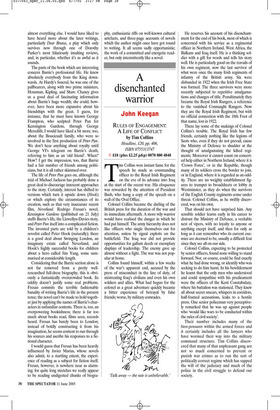A disenchanted warrior
John Keegan
RULES OF ENGAGEMENT: A LIFE OF CONFLICT by Tim Collins Headline, £20, pp. 406, ISBN 0755313747 ✆ £18 (plus £2.25 p&p) 0870 800 4848 Tim Collins won instant fame for the speech he made as commanding officer to the Royal Irish Regiment on the eve of its advance into Iraq at the start of the recent war. His eloquence was rewarded by the attention of President Bush, who hung a copy of the speech on a wall of the Oval Office.
Colonel Collins became the darling of the British press for the duration of the war and its immediate aftermath. A more wily warrior would have realised the danger in which he had put himself. The army hierarchy does not like officers who single themselves out for attention, unless by signal exploits on the battlefield. The Iraq war did not provide opportunities for gallant deeds or exemplary displays of leadership. The enemy gave up almost without a fight. The war was not popular at home.
Collins found himself, within a few weeks of the war’s apparent end, accused by the press of misconduct in the line of duty, of mistreating Iraq’s civilians and even his own soldiers and allies. What had begun for the colonel as a great adventure quickly became a bitter experience of betrayal by false friends; worse, by military comrades. He reserves his account of his disenchantment for the end of his book, most of which is concerned with his service as a regimental officer in Northern Ireland, West Africa, the Balkans and Iraq itself. He is a thinking soldier with a gift for words and tells his story well. He is particularly good on the travails of his own regiment, now the last survivor of what were once the many Irish regiments of infantry of the British army. Six were disbanded in 1922 when the Irish Free State was formed. The three survivors were more recently subjected to repetitive amalgamations and changes of title. Penultimately they became the Royal Irish Rangers, a reference to the vanished Connaught Rangers. Now they are the Royal Irish Regiment, but with no official connection with the 18th Foot of that name, lost in 1922.
There lay some of the makings of Colonel Collins’s trouble. The Royal Irish has few friends, certainly nothing like the legions of Scots who, even if they do not prevail, cause the Ministry of Defence to shudder at the thought of amalgamating the kilted regiments. Moreover it cannot count on concerted help either in Northern Ireland, where it is ‘Crown Force’, or in the Republic, though many of its soldiers cross the border to join, or in England, where it is regarded as an oddity. There are no weighty establishment figures to trumpet to broadsheets or lobby in Westminster, as they do when the survivors of the English County regiments come under threat. Colonel Collins, as he swiftly discovered, was on his own.
That should not have surprised him. Any sensible soldier learns early in his career to distrust the Ministry of Defence, a veritable nest of vipers, with no loyalty to anyone or anything except itself, and then for only as long as it can remember who its current enemies are deemed to be, usually a difficult feat since they are all on our side.
Colonel Collins, expecting to be protected by senior officers, found none willing to stand forward. Nor, or course, could he find exactly what he had done wrong, or identify who was seeking to do him harm. In his bewilderment he learnt that the only men who understood and could sympathise with his predicament were the officers of the Kent Constabulary, where his battalion was stationed. They knew all about secret smears, whispers in corridors, half-framed accusations, leaks to a hostile press. One senior policeman very perceptively remarked that he was up against people who ‘would like wars to be conducted within the rules of civil society’.
Their number includes many of the bien-pensants within the armed forces and it certainly includes all the lawyers who have wormed their way into the military command structure. Tim Collins discovered that many of that unpleasant gang are not so much concerned to prevent or punish war crimes as to run the sort of politically correct regime which has sapped the will of the judiciary and much of the police in the civil struggle to defend our society.


















































 Previous page
Previous page